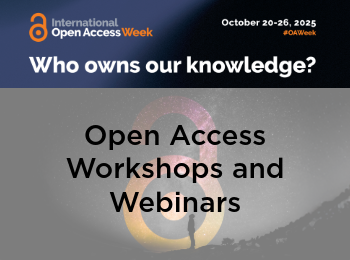International Open Access Week is October 20-26! This year’s theme, Who Owns Our Knowledge?, invites us to reflect on how research is shared and who has access to it.
Explore open access through our recorded workshops:
- Predatory Journals: The Dark Side of Open Access
- Increase Your Citations Through Open Access, Preprints and Postprints
- Maximizing Your Research Identity and Measuring Research Impact
- Negotiating Publishers Agreements
- Where to Publish your Research
Check out the library guide to learn more about why open access is important, how you can publish your work openly, and how to retain your copyright.
